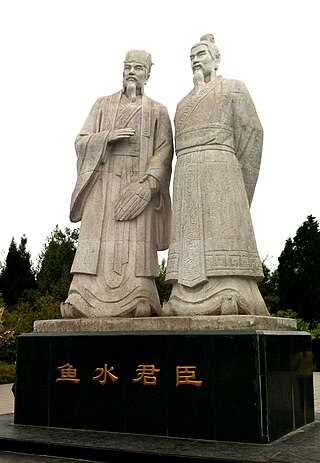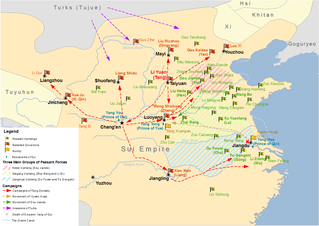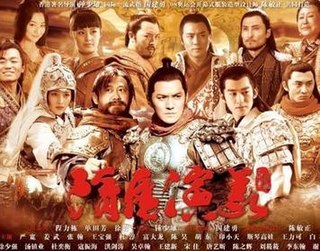Yang You, also known by his posthumous name as the Emperor Gong of Sui (隋恭帝), was an emperor of the Chinese Sui dynasty. He was installed as a puppet emperor by Li Yuan. After Li Yuan founded the Tang dynasty, he had Yang You executed.

The grand chancellor, also translated as counselor-in-chief, chancellor, chief councillor, chief minister, imperial chancellor, lieutenant chancellor and prime minister, was the highest-ranking executive official in the imperial Chinese government. The term was known by many different names throughout Chinese history, and the exact extent of the powers associated with the position fluctuated greatly, even during a particular dynasty.
Feng Lun, courtesy name Deyi, better known as Feng Deyi, formally Duke Miao of Mi, was a Chinese official of the Sui and Tang dynasties who served as a chancellor during the reigns of Emperor Gaozu of Tang and Emperor Taizong of Tang. He was praised for his quick thinking but criticized by historians for his being overly attentive to the emperors' desires.

Qin Qiong, courtesy name Shubao, better known as Qin Shubao, was a Chinese general who lived in the early Tang dynasty of China. Along with Yuchi Gong, he continues to be worshipped in China as a door god. He is also known by his posthumous name Duke Zhuang of Hu.
Yang Tong, known in traditional histories by his princely title of Prince of Yue (越王) or by his era name as Lord Huangtai (皇泰主), also known by his posthumous name as the Emperor Gong of Sui (隋恭帝), courtesy name Renjin (仁謹), was an emperor of China's Sui dynasty. During the disturbances that permeated throughout the Sui state late in the dynasty's history, his grandfather Emperor Yang left him in charge of the eastern capital Luoyang, and after Emperor Yang was killed by the general Yuwen Huaji in 618, the Sui officials in Luoyang declared Yang Tong emperor. However, soon one of those officials, Wang Shichong, seized power, and in 619 had Yang Tong yield the throne to him, ending the Sui dynasty. Soon, he was killed on Wang's orders.

Dou Jiande was a Chinese rebel leader who led the agrarian rebels who rose against the rule of Emperor Yang of Sui near the end of the Chinese Sui dynasty. Generally considered the kindest and most able of the agrarian rebel leaders of the time, he was eventually able to capture the modern Hebei region and declare himself initially the Prince of Changle, and then the Prince of Xia. In 621, when the Tang dynasty general Li Shimin attacked Wang Shichong the Emperor of Zheng, who ruled the modern Henan region, Dou believed that if Tang were able to destroy Zheng, his own Xia state would suffer the same fate, and therefore went to Wang's aid, against the advice of his strategist Ling Jing (凌敬) and his wife Empress Cao. Li defeated him at the Battle of Hulao, capturing him. Li's father Emperor Gaozu of Tang subsequently put Dou to death. Xia territory was briefly seized by Tang, but soon Dou's general Liu Heita rose against Tang rule, recapturing Dou's territory, and held out against Tang until 623.

Yuwen Huaji was a Chinese military general, monarch, and politician of the Sui dynasty who, in 618, led a coup against and murdered Emperor Yang of Sui. He subsequently declared Emperor Yang's nephew Yang Hao emperor and led Emperor Yang's elite Xiaoguo Army (驍果) north. However, he was then repeatedly defeated by Li Mi, Li Shentong (李神通), and finally Dou Jiande. Believing that his defeat was near and wanting to become emperor before his ultimate defeat, he poisoned Yang Hao and declared himself the emperor of a Xu state. Dou captured him in 619 and killed him.

Luo Yi, known during service to the Tang dynasty as Li Yi (李藝), courtesy name Ziyan (子延) or Ziting (子廷), was a Sui dynasty official who rose against the rule of Emperor Yang of Sui and occupied the modern Beijing region. He subsequently submitted to Emperor Gaozu of Tang and was created the Prince of Yan and granted the imperial surname of Li. He subsequently, in the struggle between Emperor Gaozu's sons Li Jiancheng the Crown Prince and Li Shimin the Prince of Qin, joined Li Jiancheng's faction. After Li Shimin killed Li Jiancheng in 626 and forced Emperor Gaozu to yield the throne to him, Li Yi was fearful, and he rebelled against Emperor Taizong in 627. He was soon defeated and killed.

The transition from Sui to Tang (613–628) was the period of Chinese history between the end of the Sui dynasty and the start of the Tang dynasty. The Sui dynasty's territories were carved into a handful of short-lived states by its officials, generals, and agrarian rebel leaders. A process of elimination and annexation followed that ultimately culminated in the consolidation of the Tang dynasty by the former Sui general Li Yuan. Near the end of the Sui, Li Yuan installed the puppet child emperor Yang You. Li later executed Yang and proclaimed himself emperor of the new Tang dynasty.
Yuwen Shiji, courtesy name Renren, formally Duke Zong of Ying, was a Chinese statesman and politician of the Sui and Tang dynasties, serving as a chancellor, as Shizhong (侍中) (625–626) and Zhongshu Ling (中書令) (626–627), during the reigns of Emperors Gaozu and Taizong of Tang. He was previously an imperial prince in the short-lived state of Xu (許), which was ruled by his brother Yuwen Huaji.
Xu Jingzong, courtesy name Yanzu, posthumously known as Duke Gong of Gaoyang, was a Chinese cartographer, historian, and politician who served as a chancellor in the Tang dynasty. Allied with Emperor Gaozong's powerful wife, Empress Wu, Xu Jingzong was exceedingly powerful and effective throughout most of Gaozong's reign. By order of Empress Wu, he played a major role in the elimination of the chancellors opposed to her, between years 657 to 659 and 665.
Shangguan Yi, courtesy name Youshao (游韶), formally Duke of Chu (楚公), was a Chinese poet and politician. He was an official of the Chinese Tang dynasty, serving as chancellor during the reign of Emperor Gaozong. In 664, Emperor Gaozong was displeased with his wife Empress Wu for her controlling behavior, and grew resentful of her controlling influence in the empire. Shangguan proposed to Emperor Gaozong that Empress Wu be deposed. The emperor was initially receptive to this proposal, but disavowed it once Empress Wu discovered the plot. Empress Wu then had Shangguan accused of plotting treason with Emperor Gaozong's oldest son, the former crown prince Li Zhong, and Shangguan was executed. Empress Wu then began to attend state assemblies and to oversee the emperor's actions and decisions, hearing all the details of the government and obvious intervening in the government. Shangguan's granddaughter Shangguan Wan'er later served as a key secretary to Empress Wu and a beloved concubine to her son Emperor Zhongzong.

Yao Silian, courtesy name Jianzhi (簡之), formally Baron Kang of Fengcheng (豐成康男), was a Chinese historian and politician during the Sui dynasty and Tang dynasty and was the lead author of the Book of Liang and Book of Chen, the official histories of the Liang dynasty and the Chen dynasty, which his father Yao Cha (姚察), a Chen official, had begun but did not finish.

Twin of Brothers is a 2011 Chinese wuxia television series directed by prolific Hong Kong film director Wong Jing adapted from Huang Yi's novel of the same Chinese title. The series stars Hong Kong actors Danny Chan and Alex Fong as the "Twin Dragons", Kou Zhong and Xu Zhiling respectively. Executive producer Tie Fo stated this series will the first in a trilogy in order to fully explore Huang's novel. The series aired on CCTV-1 from 8 to 30 August 2011.

The Prince of Qin, Li Shimin is a 2005 Chinese television series loosely based on the early life of Li Shimin, who later became Emperor Taizong of the Tang dynasty. It focuses on Li Shimin's romance with Ruoxi, a fictitious Sui Dynasty princess.

Initiating Prosperity is a Chinese historical television series based on events in a period in Chinese history known as the Transition from the Sui dynasty to the Tang dynasty. The series was directed by Wang Wenjie and starred Shen Xiaohai, Liu Wenzhi, Zhang Zijian, Sun Feifei and Bao Guo'an. It was first broadcast on television stations in China in 2006.

Heroes in Sui and Tang Dynasties is a Chinese television series based on Chu Renhuo's historical novel Sui Tang Yanyi, which romanticises the historical events leading to the fall of the Sui dynasty and the rise of the Tang dynasty. The series was first broadcast in mainland China on various television networks on 14 January 2013. It is not to be confused with Heroes of Sui and Tang Dynasties 1 & 2, a similar television series also based on the novel, but was released earlier in December 2012. Filming for the series started on 5 November 2011 at the Hengdian World Studios and wrapped up in May 2012.

Heroes of Sui and Tang Dynasties 1 & 2 is a 2012 Chinese historical television series directed by Li Hantao. It was first aired on Hunan Television in China in 2012. The series is based on the events in the reign of Emperor Yang of Sui during the Sui dynasty and Tang dynasty. The series stars Dicky Cheung, Winston Chao, Liu Xiaoqing, Yu Shaoqun, Wezei, Kou Hsi-Shun, Yoki Sun, Jang Seo-hee, and Lan Yan. It is followed by the sequel Heroes of Sui and Tang Dynasties 3 & 4.

The "18 Warriors of Sui-Tang Period" are fictional legendary heroes who lived in the Sui dynasty and early Tang dynasty. The concept of 18 Warriors was first mentioned in the traditional historical novel Shuo Tang. The warriors' rankings are based on their skills in martial arts as well as their physical strength. Some of them have historical archetypes such as Qin Shubao and Shan Xiongxin, while authors of folk stories such as Luo Cheng and Yuwen Chengdu create others.
Wagang Army was a key rebel army in the late Sui dynasty of China. The Wagang Army was primarily led by Zhai Rang before 617, and Li Mi after 617. To its greatest extent, it occupied major territories in the Henan and Shandong provinces. It was one of the three strongest peasant forces of its time, the other two being Dou Jiande's army in Hebei and Du Fuwei's army in the south. The Wagang Army played a significant role in overthrowing the Sui dynasty.












